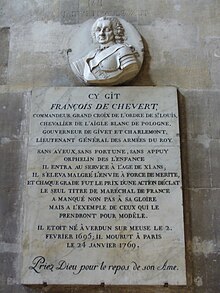François de Chevert

François de Chevert (born February 2, 1695 in Verdun , † January 24, 1769 in Paris ) was a French military leader.
Life
François de Chevert entered the army service in 1706, was major (head of regiment administration) of the Régiment de Beauce in Toul in 1728 and lieutenant colonel in 1739 . He proved his merit and his military abilities in the campaigns in Flanders , Piedmont and the empire , on which his military advancement was based.
In the First Silesian War he succeeded on November 26, 1741, the capture of Prague at the head of his grenadiers and the defense of the city against the Austrian invaders, which earned him the rank of Brigadier des armées du roi .
He then took part in campaigns in the Dauphiné and in Italy, whereupon he was promoted to Maréchal de camp in 1744 . During the campaign in Provence , he succeeded in conquering the island of Sainte-Margueritte. After this success he was appointed lieutenant-général in 1748 .
He took command on his last campaign in the Seven Years' War and contributed to victory in the Battle of Hastenbeck . In the course of his illustrious military career, in which he went through all stages, François de Chevert seemed to be crowned exclusively by successes.
As a major of his regiment, he was awarded the order of "Chevalier de Saint-Louis" in 1742, the order of "Commandeur" in 1754 and the order of "Grand Croix" in 1758, and in the same year he was made the "Knight of the White Eagle" in Poland .
He was governor of Givet and Charlemont until his death.
Inscription on his tombstone
This is the wording of the inscription written by Diderot on the tombstone of François de Chevert in St-Eustache de Paris :
“Without ancestors, without wealth, without support, without parents since early childhood, he entered the military at the age of 11. Despite numerous envious people, he achieved the military advancement he deserved, and each higher degree was the result of an act of glory. Only the marshal's baton was missing, not for his fame, but as an example for all who take him as a role model. "
literature
- Jean B. Boulliot, Biography Ardennaise ou histoire des Ardennais , Volume 1, pp.240f
- François Noel, Ephemerides politiques, litteraires et religieuses , pp.208f
- Rousseau, Journal encyclopédique , pp.119f
- Jean-Bernard Restout, Galerie françoise: ou Portraits des hommes et des femmes célèbres , Volume 1, pp. 30ff
| personal data | |
|---|---|
| SURNAME | Chevert, François de |
| BRIEF DESCRIPTION | French general |
| DATE OF BIRTH | February 2, 1695 |
| PLACE OF BIRTH | Verdun |
| DATE OF DEATH | January 24, 1769 |
| Place of death | Paris |